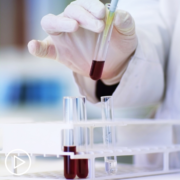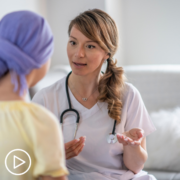Why Should CLL Patients Speak Up About Treatment Side Effects?
Why Should CLL Patients Speak Up About Treatment Side Effects? from Patient Empowerment Network on Vimeo.
How can chronic lymphocytic leukemia (CLL) patients benefit from speaking up about their treatment side effects? Dr. Lindsey Roeker explains how these important discussions can impact a patient’s quality of life.
Dr. Lyndsey Roeker is a hematologic oncologist at Memorial Sloan Kettering Cancer Center. Learn more about Dr. Roeker here.
Related Resources

What CLL Tests Are Essential and How Do Results Impact Treatment and Prognosis? |

Is the COVID-19 Vaccination Safe for CLL Patients in Treatment? |

|
Transcript:
Katherine:
Why is it important for patients to speak up if they’re experiencing side effects? I know that they sometimes feel like they’re bothering their healthcare team.
Dr. Roeker:
Thank you for that question, because it’s really important point. Side effects are easiest to manage when you catch them early. So, when people have, for instance, muscle pain or joint aches, I have lots of tricks up my sleeve to help people, but I need to know about it. So, if people don’t tell me until they have joint pain that’s so bad that they’re not able to exercise or not able to get out of bed easily in the morning, that’s taking it – it’s gone on for a while at that point, and it’s pretty far down the line.
First of all, you wouldn’t have had to suffer for that long because we have ways of fixing it, and second, it’s always harder to fix a problem once it’s further down the line than earlier on. So, I talk to people about what side effects they might experience and what to expect, and then we talk about different management strategies to really nip it early so that we’re not dealing with a really huge problem down the line.





